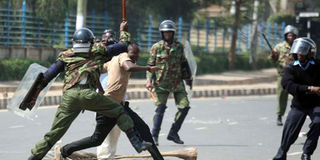Our politicians and police are neither polished nor polite

Police officers attack a protestor outside Anniversary Towers in Nairobi on May 16, 2016 during a protest against the Independent Electoral and Boundaries Commission. PHOTO | EVANS HABIL | NATION MEDIA GROUP
What you need to know:
- Why do I say that "politician" is a misnomer for anybody who perpetually campaigns for a public office?
- For the reason that the word belongs to the etymological family that includes such positive institutions as policy and police.
In all countries, but especially Kenya, the word politician is surely a misnomer. A misnomer is any incorrect or inappropriate name for a person, thing or idea. Mrs Malaprop of British theatre infamy was called so because she committed language malapropism shamelessly, all over the place, all the time.
Why do I say that politician is a misnomer for anybody who perpetually campaigns for a public office? For the reason that the word belongs to the etymological family that includes such positive institutions as policy and police and to such positive attributes as polite and polished.
Yet, as portrayed by the media, the practice in Kenya’s political arena is the very opposite. In general, the politicians use the most impolite language against one another. And the police behave in the most impolite and most unpolished manner vis-à-vis those whom they apprehend. I have lived in continental European countries where, although the police abound everywhere, yet they are nowhere to be seen.
Yet, fanya fujo uone! And when the police arrest you, although they are quite firm, they are never insolent and impolite or too quick with their cudgels and other weapons. That is noteworthy because insolence, impoliteness and cruelty – the hallmark of Euro-colonial policing throughout Africa and other Third World continents – are already forms of punishment. Thus, by the time that a suspect is taken to court, the police have already reduced him or her to mincemeat. They have thoroughly clobbered him or her. The point, however, is that, in certain societies – especially Western European – the police appear completely aware that it is not their job to punish suspects.
On the contrary, policemen see their job as merely to arrest suspects – treating them as innocent – until they hand them over to the institution properly mandated by society to judge whether the individuals really have offended society as charged, and to mete out an appropriate punishment.
The question is why – generally speaking – have so many Third World societies, especially Kenya, failed to cultivate a police force as an instrument in the hands of the people – an institution with a human-face, an instrument sociologically knowledgeable, perpetually friendly and ready with assistance in all situations? The answer to that question, I think, is that, in its present form, the police remain a Euro-colonial import of the 1920s, when – in classical European racism – black people were assumed to be criminal in their very genes and must, therefore, be policed extremely closely and, when caught, punished with all thoroughness.
Thus – even half a century into independence – the police cannot help appearing as an anti-people force. It still seems to see its mission not as to prevent fault and help to transform society by delivering it from itself, but merely to catch offenders, in the process, deriving carnival joy in punishing them. No, we cannot justifiably assert that ours is a criminal force.
What seems suspect in its present form is only the basic assumption underlying their training and mental conditioning. Are our officers trained to be unfailing instruments of mutual assistance? Can Kenyans trust their police force as their instrument and exemplars of national justice, national friendship, national trust and national peace?
Or are they trained to ensure social order merely by finding fault among the people – by wielding bayonets, bazookas, rungus and teargas canisters – in the process? To be sure, occasion often demands just these. But recall to your mind that to rid ourselves of just such occasions was why civilised mankind invented the police system.
The police force might find popularity overnight only if policemen and women begin enlisting the people as their special assistants in the national task of ensuring peace, prosperity, security and wealth.





